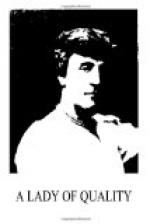She spoke to a lacquey and bade him bring the drink, for even as she sank into her place Anne’s cheeks grew whiter.
When ’twas brought, her ladyship poured it forth and gave it to her sister with her own hand, obliging her to drink enough to bring her colour back. Having seen to this, she addressed the servant who had obeyed her order.
“Hath Jenfry returned from Sir John Oxon?” she demanded, in that clear, ringing voice of hers, whose music ever arrested those surrounding her, whether they were concerned in her speech or no; but now all felt sufficient interest to prick up ears and hearken to what was said.
“No, my lady,” the lacquey answered. “He said that you had bidden him to wait.”
“But not all day, poor fool,” she said, setting down Anne’s empty glass upon the salver. “Did he think I bade him stand about the door all night? Bring me his message when he comes.”
“’Tis ever thus with these dull serving folk,” she said to those nearest her. “One cannot pay for wit with wages and livery. They can but obey the literal word. Sir John, leaving me in haste this morning, I forgot a question I would have asked, and sent a lacquey to recall him.”
Anne sat upright.
“Sister—I pray you—another glass of wine.”
My lady gave it to her at once, and she drained it eagerly.
“Was he overtaken?” said a curious matron, who wished not to see the subject closed.
“No,” quoth her ladyship, with a light laugh—“though he must have been in haste, for the man was sent after him in but a moment’s time. ’Twas then I told the fellow to go later to his lodgings and deliver my message into Sir John’s own hand, whence it seems that he thinks that he must await him till he comes.”
Upon a table near there lay the loaded whip; for she had felt it bolder to let it lie there as if forgotten, because her pulse had sprung so at first sight of it when she came down, and she had so quailed before the desire to thrust it away, to hide it from her sight. “And that I quail before,” she had said, “I must have the will to face—or I am lost.” So she had let it stay.
A languishing beauty, with melting blue eyes and a pretty fashion of ever keeping before the world of her admirers her waxen delicacy, lifted the heavy thing in her frail white hand.
“How can your ladyship wield it?” she said. “It is so heavy for a woman—but your ladyship is—is not—”
“Not quite a woman,” said the beautiful creature, standing at her full great height, and smiling down at this blue and white piece of frailty with the flashing splendour of her eyes.
“Not quite a woman,” cried two wits at once. “A goddess rather—an Olympian goddess.”
The languisher could not endure comparisons which so seemed to disparage her ethereal charms. She lifted the weapon with a great effort, which showed the slimness of her delicate fair wrist and the sweet tracery of blue veins upon it.




